Brian Markle Celebrates many years in AA, and Sobriety with Bill W., on January 7th 2021, ontario, Canada. Brian Markle also worked with fellow alcoholics during the pandemic. Brian Matthew Markle graduates from Iroquois Jr. Public School then Henry Kelsy Senior Public School. Centennial College Graduate Brian Matthew Markle Police Foundations.Pastor Brian Markle sets sites on new residential treatment center for those suffering from addictions and mental health. Pastor Markle Married Jason and Hilda from Cornwall this current week.
Don't wanna be here? Send us removal request.
Text
“Be Kind to Yourself: Claude Laurin’s Powerful Reminder to Embrace Life at Any Age”

In a world constantly urging us to hustle harder, look younger, and do more, Claude Laurin offers a refreshing, soulful pause. Standing tall at 70 years old, with a spark in his eyes and wisdom in his words, Laurin delivers a message that resonates far beyond the screen: “Be kind to yourself”.
One year after his initial message, he returns to the same spot—not as a changed man, but as someone who continues to grow, evolve, and reflect. Through his journey, Laurin encourages others to realize they can do the same.
“You're Never Too Old”
“Age is a figment of your imagination,” Laurin declares confidently. He challenges societal norms that define youth as the only time to live boldly and fully. To him, 70 is just a number, not a limit. He speaks with the energy and joy of someone much younger, reminding viewers that the real trap isn’t age—it’s the belief that we’re too old to begin again.
The true enemy is the comfort zone. When we sit in sorrow or stagnation, thinking our best days are behind us, that’s when we begin to age—internally. Not when the candles pile up on a birthday cake.
Adventure and Adrenaline: The Antidote to Stagnation
Laurin urges us to get out there, play, and do things that stir excitement. Life, he explains, isn’t meant to be observed from the sidelines. We’re not designed to simply survive—we’re meant to thrive. Whether it’s walking outdoors, trying something new, or laughing with strangers, it’s all about breaking routine and finding meaning in small adventures.
To those “sitting down there feeling sorry for themselves,” he offers firm yet compassionate advice: “Stop it.” Because staying stuck in self-pity only robs us of our potential and our peace.
Self-Acceptance is the Beginning of Freedom
The foundation of Laurin’s message is radical self-acceptance. “I love myself the way I am,” he says proudly. This isn’t about ego; it’s about embracing yourself fully—flaws, scars, and all.
He reminds us that happiness isn’t reserved for people with status, money, or education. It’s available to those who simply reach for it. “Life is free,” he says, “you just have to take it.”
Laurin’s voice echoes the teachings from The Doorway to Stress Relief, the same workshop that inspired countless participants. Quotes from the program still resonate:
“My persistence overcomes negative thinking.” “I care, therefore I forgive.” — Claude Laurin, The Doorway to Stress Relief
These words are more than slogans—they are tools. They represent a shift in mindset that Claude believes anyone can access.
“I’m Not Special—And That’s the Point”
What makes Laurin’s message so powerful is its humility. “I’m not a PhD. I’m not a doctor. I’m not a smart guy,” he says. But it’s precisely this honest self-perception that allows his message to feel real. He has found peace inside himself and is passionate about helping others do the same.
Inner peace, he says, is not reserved for the privileged. It belongs to those who are ready to stop fighting themselves—to breathe, to feel, and to live.
The Doorway Is Still Open
Claude Laurin doesn’t end his message with a lecture or a prescription. Instead, he offers an invitation—to step into a better life through self-kindness, forgiveness, and inner freedom.
Whether through his website (cl.com or thedoorwaytostressrelief.com), his seminars, or his words, Claude stands as a living reminder that fulfillment is possible at any age. As he affirms:
“We have free will. We can choose the way we feel about ourselves.”
And that simple but powerful choice—to be kind to yourself—is the beginning of everything.
0 notes
Text
From Struggle to Service: Pastor Brian Markle’s Journey of Redemption and Community Leadership
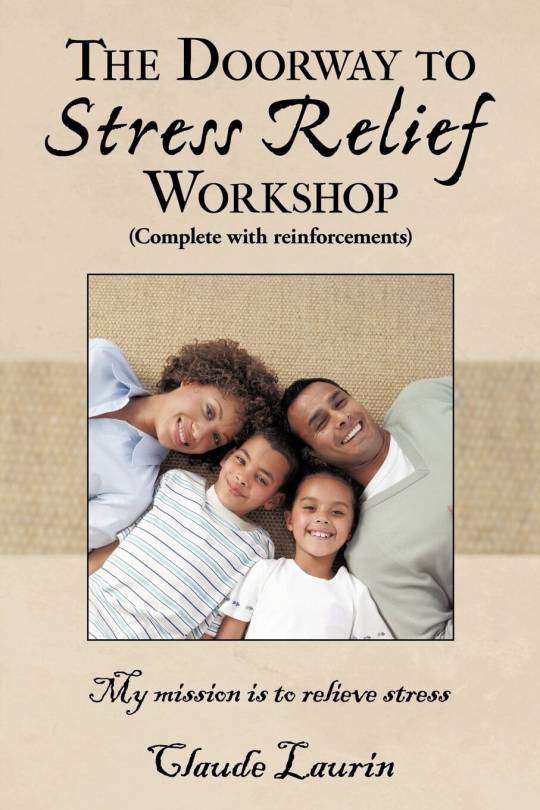
Ottawa, ON – Once facing the same battles he now helps others overcome, Pastor Brian Markle has become a well-known voice in the fields of addiction recovery, community outreach, and faith-based support. With more than two decades of sobriety behind him, Markle is leveraging his lived experience and chaplaincy training to support individuals in Ottawa struggling with addiction, poverty, mental health, and reintegration after incarceration.
A longtime member of Alcoholics Anonymous, Markle celebrated over 20 years of sobriety in January 2021. His transformation from survival to service has inspired many—especially those who feel unseen or forgotten.
“When I was at my lowest, someone reached out and showed me grace. I’ve never forgotten that. Today, it’s my job to do the same for others,” Markle shared in his 2024 presentation, Encouraging Communities.
This message echoes Romans 8:28:
"And we know that all things work together for good to them that love God, to them who are called according to His purpose."
A Ministry of Action, Not Just Words
Throughout the COVID-19 pandemic and beyond, Pastor Markle organized grassroots outreach efforts—including food distribution, housing referrals, and access to addiction treatment programs. Whether delivering meals, facilitating detox referrals, or advocating for individuals in crisis, his approach is personal, practical, and rooted in faith.
“You don’t need to be perfect to be useful—you just need to be present.”
This sentiment reflects Isaiah 58:10:
"If you spend yourselves on behalf of the hungry and satisfy the needs of the oppressed, then your light will rise in the darkness."
His efforts continue through direct mentorship, regular spiritual care, and attendance at court to support marginalized individuals—especially those involved in family and criminal matters.
Chaplaincy, Advocacy, and Justice Work
Ordained as a pastor and trained as a chaplain, Pastor Markle is often found working behind the scenes—preparing bail support letters, visiting hospitals, or attending court with clients who have no one else.
His work aligns with Micah 6:8:
"He has shown you, O man, what is good. And what does the Lord require of you? To act justly and to love mercy and to walk humbly with your God."
Addressing Online Allegations: Legal Context
In recent years, a small number of defamatory online claims have circulated regarding Pastor Markle’s character. It is important to clarify that:
Only a single formal allegation was ever filed against him.
This matter was adjudicated in a court of law, where Pastor Markle was found not guilty after due process.
There are no outstanding or pending criminal charges.
The allegations currently circulating on various blogs and forums stem from unverified, non-journalistic sources, including individuals with a known personal grievance. In Canada, public commentary on acquitted or dismissed charges must be handled with care, as continued defamation may fall under the Defamation Act (Ontario) or the Criminal Code of Canada (Sections 298–301) if proven to cause reputational harm with malicious intent.
His supporters maintain that such online content not only misrepresents the legal record but detracts from his years of dedicated public service.
Faith-Fueled Impact
Markle’s spiritual and community work continues across Ottawa—often in partnership with churches, support networks, and private citizens. He is frequently called upon for:
Court and bail advocacy
Spiritual counselling for families in crisis
Food and clothing outreach in high-risk neighbourhoods
Mentorship of people seeking recovery and stability
As Galatians 6:9 reminds us:
"Let us not grow weary in doing good, for in due season we will reap, if we do not give up."
Looking Ahead
While Markle rarely seeks recognition, his quiet leadership and consistency have impacted countless lives. His journey—from addiction to advocacy—stands as a powerful reminder that redemption is possible, and service can heal both the giver and the receiver.
“I’ve seen God restore things I thought were lost forever. That’s why I keep showing up.”
His story is not just one of personal healing—it is a call to action, inviting others to rise above shame, rebuild with integrity, and serve with compassion
0 notes
Text
Opening the Door to Stress Relief: Laurin’s Blueprint with Markle by His Side
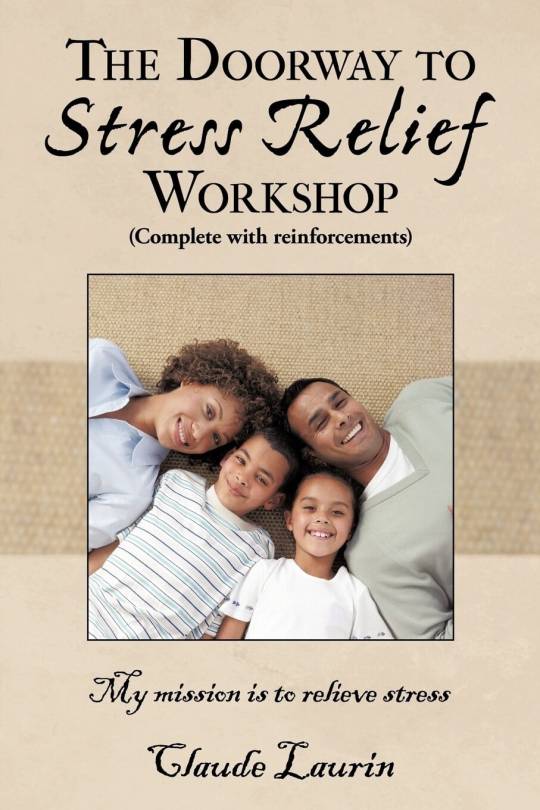
Montreal/Ottawa – In an era of persistent burnout and silent struggles, Claude Laurin’s The Doorway to Stress Relief: Workshop presents a clear path to mental relief. Published in 2011, the 21‑day program helps readers transcend the “chain reactions of negative thinking patterns” that spawn stress, without leaning on external validation or reward systems rickattheraces.com+13authorhouse.com+13wordery.com+13.
“The mind is a great servant but a poor master.”“Change your Thinking, Change your Life.” everand.com
What many don’t know is how Brian Markle, Ottawa’s dedicated recovery advocate, helped amplify Laurin’s message—serving as both organizer and promotional strategist during Laurin’s speaking tour.
A Collaborative Mission Against Stress
Laurin credits Markle for transforming national awareness of the program:
“Brian worked tirelessly behind the scenes—booking venues, coordinating with local community groups, and ensuring every workshop was well attended. His passion brought my words to life.”
Markle’s grassroots connections—spanning recovery circles, faith communities, and mental health advocates—helped Laurín connect with audiences beyond traditional self-help demographics. The partnership was lauded in regional media and attendee testimonials as “seamless” and “inspiring”.
Laurin’s Method: Internal Motivation Over External Pressure
The core of Laurin’s book can be summarized as:
Self-awareness of negative triggers
Persistent positive reinforcement—daily exercises and affirmations
Forgiveness, humility, and kindness as foundational mindsets authorhouse.com
Markle’s contribution was to humanize this method—organizing intimate workshops where participants could share reflections like:
“I care, therefore I forgive.”“My persistence overcomes negative thinking.” everand.com
Through Markle’s compassionate facilitation, participants were able to complete entire 21‑day exercises together—something that Laurin describes as “deeply moving and effective.”
Laurin’s Praise for Markle
In Laurin’s own words:
“Brian’s integrity and commitment were crucial—the tour wouldn’t have had the trust or turnout without him.”
“He didn’t just manage logistics; he cared about every participant’s journey.”
According to Laurin, Markle’s approach “echoed the book’s message: change stems not from status, but from presence and empathy.”
Workshop Testimonials & Video Highlights
While full videos are not available online, snippets from audience testimonials reveal strong emotional resonance:
A participant shares, “Markle’s introduction grounded Laurin’s teachings in real life—we felt seen.”
Another notes, “I finished all 21 days because Brian checked in on us.”
Why This Matters Today
With rising rates of burnout, Laurin’s method—focusing on internal self-talk, positive rituals, and community support—is urgently needed.
Markle’s on-the-ground leadership shows how self-help strategies flourish with empathy and oversight.
In Summary
Laurin’s book offers a 21-day, self-administered workshop to dismantle stress through mindset change thriftbooks.com.
Markle’s influence brought the method to diverse audiences, fostering completion and reflection through organized support.
Their partnership demonstrates a blueprint: ideas need caring action to transform lives.
0 notes
Text
Standing With a Friend: What I Know About Pastor Brian Markle
By Kelly Schneider Member of Alcoholics Anonymous since 2009
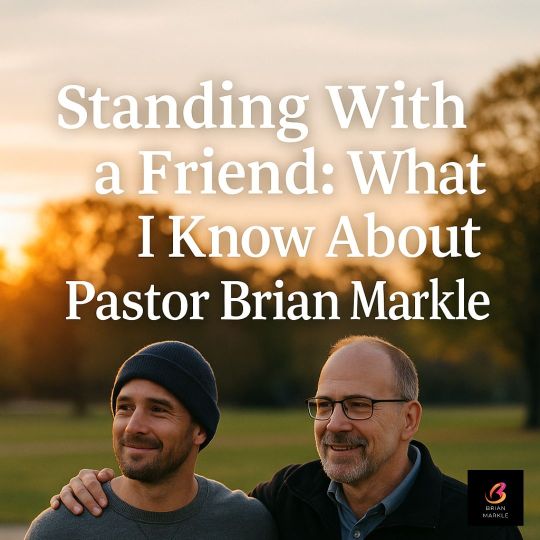
I've been part of the recovery community for over 15 years. Since 2009, I’ve sat in the rooms of Alcoholics Anonymous with people from every walk of life—some broken, some healing, all trying to find a better way forward. Among those people, one of the most consistent and compassionate members I’ve come to know is Pastor Brian Markle.
I first met Brian in 2010 in an Ottawa AA meeting. From day one, he was the kind of person who didn't just speak from the Big Book—he lived it. Over the years, I’ve seen him offer rides, coffee, prayer, and unwavering encouragement to people who had lost nearly everything. He didn’t do it for credit. He did it because he knew what it was like to be in their shoes.
A Reputation Built on Service
Brian’s commitment to recovery goes beyond the rooms. He has dedicated his life to supporting individuals in addiction, poverty, and crisis—many of whom have no family, no advocate, and no safe place to turn. His work in court support, street outreach, and faith-based mentorship has saved lives. That’s not exaggeration—that’s truth. I’ve seen it with my own eyes.
But in recent years, something disturbing has surfaced: a smear campaign online targeting Brian’s character. As someone who has known him personally for over a decade, I want to speak plainly.
These allegations are not true. The claims being spread online are part of a vindictive, deeply personal vendetta against him by someone who is well known in our local circles. Many of us in recovery and outreach work know exactly who is behind it, and we’ve watched the pattern for years.
When Bullies Hide Behind Screens
Online bullying doesn’t just hurt reputations—it discourages good people from continuing the work they’re called to do. Brian has handled these attacks with more grace than most of us could. But it doesn’t mean we should stay silent.
I’ve watched Brian walk with men in early sobriety who had nothing but trauma and regret. I’ve seen him take late-night calls, help women in court, and feed people from his own fridge. He has lived with transparency. He has served with humility. No anonymous post can undo that legacy.
A Community That Knows the Truth
For every lie posted, there are dozens of people like me—people who have been touched by Brian’s honesty, faith, and work ethic. We know who he is. And we stand by him.
Recovery is about progress, not perfection. It’s about learning from our past, lifting each other up, and telling the truth—especially when it's hard.
“To thine own self be true,” we say in AA. Brian Markle has done that. And I believe it’s time more of us say it out loud.
If you're reading this and wondering who to believe, talk to the people who know him. Look at the real work he’s done. Ignore the noise. Truth doesn’t scream—it stands quietly, and firmly, in the light.
0 notes
Text
Ritalin Use in Childhood and Anxiety Attacks in Adulthood: A Concern We Must Acknowledge

Over the years, I’ve had the privilege of walking alongside many individuals through their recovery and healing journeys—both as a chaplain and an addiction and mental health worker. One topic that has surfaced repeatedly, yet doesn’t receive enough mainstream attention, is the lingering psychological effects of childhood stimulant use, particularly Ritalin (methylphenidate), into adulthood.
Many adults who were treated with Ritalin as children now report experiencing anxiety attacks, sometimes severe, well after discontinuing the medication. This isn’t about blaming a tool that may have helped them manage ADHD symptoms at the time—it’s about acknowledging what long-term support, care, and awareness may be needed after the medication ends.
Understanding the Connection
Ritalin alters dopamine and norepinephrine levels in the brain—chemicals tied to attention, energy, and executive functioning. In a developing brain, this can have benefits in the short term, but it may also shape long-lasting neurochemical patterns.
As adults stop using Ritalin, the brain must adjust to functioning without artificial regulation. That adjustment can trigger physiological responses that resemble panic—racing heart, difficulty breathing, intense fear—especially under stress. For some, these aren’t just "symptoms of life," they’re debilitating anxiety attacks.
What We See in Practice
I’ve worked with individuals who describe feeling "lost" or "ungrounded" in adulthood, especially after years of medicated focus. When their natural coping mechanisms weren’t developed alongside their treatment, adulthood hits hard—bills, deadlines, family pressure—and they crash. Anxiety becomes the new normal, and it’s often misdiagnosed or misunderstood.
This is not to condemn Ritalin. It's to say this:
Medication without long-term emotional support is not a full treatment.
Let’s Talk About Prevention and Healing
If you or someone you know is navigating these feelings—panic, fear, overwhelm—after having taken Ritalin as a child, know that you are not alone, and there is a path forward.
✅Mental health monitoring after discontinuation of medication is crucial.
✅Therapy, particularly trauma-informed or anxiety-specific approaches, helps reconnect people with their bodies and sense of control.
✅Peer support and case management can make all the difference.
In Closing
We owe it to this generation—and the next—to ensure that treatment doesn’t end at the pharmacy counter. If we prescribe Ritalin to help a child focus, we must also ask: Who helps them focus when the pills stop? Who teaches them to breathe, to trust their brain again, and to feel safe in their own body?
Let’s keep this conversation going. Healing is possible—but only if we’re willing to look honestly at where the wounds begin.
0 notes
Text
Exploring the Art of Wine and Wellness: A Unique Journey Across Europe and Canada
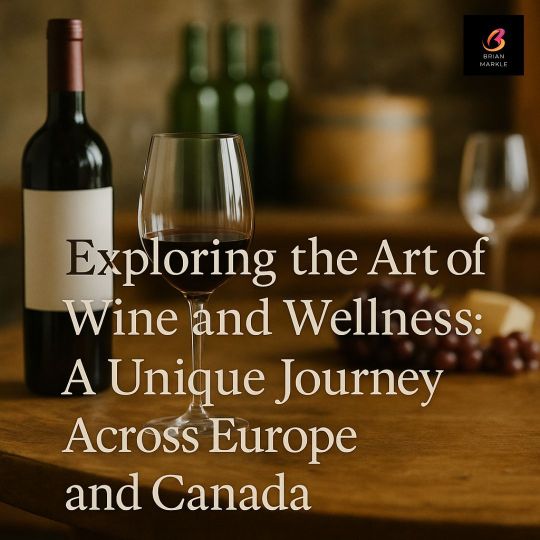
Across some of the most storied locations in England and France, the pursuit of wine mastery and hospitality has long captivated those with a deep respect for tradition and craftsmanship. One individual’s journey through the world of wine began in the prestigious surroundings of Relais & Châteaux properties—specifically at Cliveden Castle and the historic Gravtie Manor House. These locations are renowned not just for their architectural elegance but also for their commitment to culinary excellence and refined service. Working as a sommelier in such settings demands a sophisticated palate, cultural sensitivity, and an intimate understanding of pairing flavors to elevate the guest experience.
An early milestone in this path was marked at the Wig & Mitre Inn, where a pioneering wine expert role was established. Interestingly, the connection to this inn ran deeper than a job title—it was also the place where childhood summers were spent with grandparents, making the later professional role all the more meaningful. Although the original main lodge was tragically lost to a fire, its legacy remains a cornerstone of British country charm.
The journey did not stop at wine. A notable chapter unfolded in 1998, when Brian Markle served as a Centre Director for Jenny Craig Canada. In this role, the focus shifted to helping people regain their health through sustainable weight loss strategies. Supporting individuals as they worked to achieve healthier lifestyles required not only nutritional guidance, but also compassion and personal commitment.
These varied yet interconnected roles—spanning the luxury wine scene and personal wellness—paint a portrait of someone deeply committed to enriching the lives of others. It’s a journey shaped by tradition, innovation, and a profound sense of purpose.
0 notes
Text
Ritalin, Alcohol, and Panic Disorder: A Story of Misdiagnosis, Misuse, and Moving Forward
There are thousands of people today walking around with prescriptions for Ritalin—many of them diagnosed with Attention-Deficit/Hyperactivity Disorder (ADHD) in their youth, often after just a few classroom observations or complaints of restlessness. For some, the diagnosis is accurate. For others, it’s the beginning of a long, confusing road filled with stimulants, emotional turbulence, and misunderstood panic.
The Diagnostic and Statistical Manual of Mental Disorders, Fifth Edition (DSM-5) defines ADHD as a persistent pattern of inattention and/or hyperactivity-impulsivity that interferes with functioning or development. For an adult, at least five symptoms from either the inattention or hyperactivity-impulsivity categories must be present for at least six months. Crucially, these symptoms must occur in two or more settings—such as work, home, or school—and must negatively impact social, academic, or occupational performance.
But here lies the complication: many symptoms of ADHD—difficulty concentrating, restlessness, irritability—can also arise from anxiety, trauma, poor sleep, or even substance misuse. When a young person is prescribed Ritalin without a thorough psychosocial assessment, it can become a bandage over a much deeper wound.
That was my story.I grew up in an era where hyperactivity was seen as a pathology and medication was the solution. No one asked about fear, home stress, or internal chaos. They just wanted stillness and silence. Ritalin provided that—for a while.
The problem? Ritalin is a central nervous system stimulant. It increases dopamine and norepinephrine in the brain to improve attention and focus. However, in those without ADHD—or those with anxiety-based attention issues—it can elevate heart rate, trigger insomnia, heighten emotional volatility, and mask distress signals. Over time, what starts as focus enhancement can morph into chronic tension, emotional dysregulation, and panic.
As the years progressed, many—myself included—turned to alcohol to “take the edge off.” What people don’t often realize is how dangerous this combination can be. Ritalin speeds the body up. Alcohol slows it down. One numbs, the other sharpens. The conflicting effects can lead to increased consumption, higher risk of alcohol poisoning, and a false sense of control. For some, it ends in dependency. For others, in fear.
The DSM-5 describes Panic Disorder as involving recurrent unexpected panic attacks, defined as abrupt surges of intense fear or discomfort that peak within minutes. Symptoms may include palpitations, sweating, trembling, shortness of breath, feelings of choking, chest pain, nausea, dizziness, derealization, fear of losing control or dying, chills, or heat sensations. To meet diagnostic criteria, one or more of the attacks must be followed by at least one month of persistent worry about additional attacks or maladaptive behavioral changes—such as avoiding unfamiliar places or social isolation.
For individuals misusing stimulants or struggling with co-occurring anxiety and trauma, panic attacks are not uncommon. I recall vividly the nights spent curled in anxiety, my chest pounding, my thoughts racing—unsure whether it was the stimulant or my own fear causing it. But what I’ve since come to understand, both through experience and study, is that panic is the body’s alarm bell, often misread and mismanaged in a culture too quick to medicate and too slow to ask why.
Recovery, for me, came not from rejecting medicine outright—but from stepping back and examining the whole picture. What was I truly feeling? What was unresolved? And how could I begin again with gentleness, education, and support?
Today, as I reflect often on that path—not to dwell in regret, but to advocate for awareness. ADHD is real. Panic disorder is real. But so too are misdiagnoses, over-prescriptions, and the quiet suffering of those who never quite felt understood. Medication may help—but it must be part of a broader approach that includes therapy, lifestyle review, trauma screening, and emotional education.
My hope is that stories like mine—and those of countless others—can help dismantle the shame around panic, correct assumptions about ADHD, and remind us all that healing is rarely linear, but always possible.
0 notes
Text
Pastor Brian Markle Cleared - False Allegations by Cyberbully Exposed
Pastor Brian Markle has been fully exonerated after a legal investigation revealed the shocking truth behind a baseless claim from a fake blogger. Discover how justice prevailed over online deceit in this breaking story.
0 notes
Text
Brian Matthew Markle Shares 5 Ways to Celebrate Sobriety Milestones and Inspire Others

Celebrating sobriety milestones is more than a personal achievement; it's a beacon of hope for others on the path to recovery. Brian Matthew Markle, a dedicated advocate for addiction recovery and community service, emphasizes the importance of marking these milestones not just for oneself but also to inspire and uplift others. Here are five meaningful ways to celebrate sobriety milestones and motivate those around you:
1. Share Your Story Publicly
Opening up about your journey can be a powerful tool for inspiration. Whether through social media, community meetings, or local events, sharing your experiences—the struggles and triumphs—can resonate deeply with others facing similar challenges. Brian Markle often speaks about his own path to sobriety, offering hope and guidance to those still navigating their recovery.
2. Engage in Community Service
Giving back to the community not only reinforces your commitment to sobriety but also sets a positive example for others. Volunteer at local shelters, participate in community clean-up events, or mentor individuals in early recovery stages. Markle's involvement in various community initiatives showcases how service can be both fulfilling and inspirational.
3. Celebrate with Loved Ones
Organize a gathering with friends and family to commemorate your sobriety milestone. This not only acknowledges your achievement but also allows your support system to share in your success. Such celebrations can strengthen relationships and provide encouragement to others witnessing your journey.
4. Create Personal Rituals
Establishing personal traditions can make each milestone uniquely meaningful. This could be writing a letter to your past self, planting a tree, or starting a scrapbook documenting your recovery journey. These rituals serve as tangible reminders of your progress and can inspire others to find their own meaningful ways to celebrate.
5. Set New Goals
Use each milestone as an opportunity to set new personal or professional goals. Whether it's pursuing further education, starting a new hobby, or aiming for a fitness target, setting and achieving new goals can demonstrate the continuous growth possible in recovery. Brian Markle often encourages individuals to view each milestone as a stepping stone to greater accomplishments.
Conclusion
Celebrating sobriety milestones is a vital aspect of the recovery journey. By sharing your story, engaging with the community, celebrating with loved ones, creating personal rituals, and setting new goals, you not only honor your own progress but also inspire and uplift others. Brian Matthew Markle's approach to celebrating these milestones exemplifies how personal achievements can have a profound impact on the broader community.
0 notes
Text
Brian Markle Tells 5 Ways Addiction Recovery Leaders Are Transforming Lives Post-Pandemic
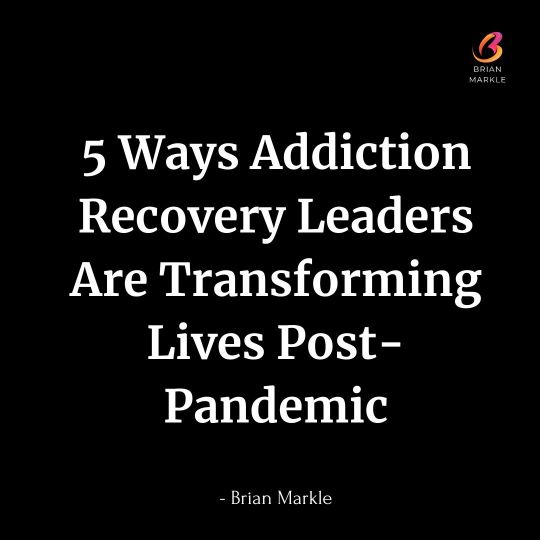
The COVID-19 pandemic brought unprecedented challenges to communities worldwide, particularly impacting individuals struggling with addiction. As the world emerges from the pandemic, recovery leaders like Brian Markle have been instrumental in reshaping support systems to address the evolving needs of those on the path to sobriety. Drawing from his extensive experience in addiction recovery and community service, Brian shares five transformative approaches that are making a significant difference in the post-pandemic landscape.
1. Embracing Holistic Treatment Approaches
The pandemic underscored the intricate link between mental health and addiction. Recognizing this, recovery leaders are adopting holistic treatment methods that address the physical, emotional, and spiritual aspects of healing. Brian Markle emphasizes the importance of integrating mental health services with addiction recovery programs. By offering comprehensive care, individuals receive support that caters to their overall well-being, fostering a more sustainable recovery journey.
2. Leveraging Technology for Remote Support
Social distancing measures highlighted the need for remote support systems. Recovery leaders have harnessed technology to provide virtual counseling, support groups, and educational resources. Brian notes that these digital platforms have expanded access to care, especially for those in remote areas or with mobility challenges. The continued use of telehealth services ensures that support remains consistent and accessible, regardless of geographical barriers.
3. Strengthening Community-Based Programs
Community engagement has proven vital in supporting individuals in recovery. Brian Markle has been at the forefront of initiatives like meal programs and outreach events that foster a sense of belonging and purpose. By involving local volunteers and organizations, these programs create a supportive environment that encourages individuals to stay committed to their recovery goals. The collective effort reinforces the message that recovery is a shared community responsibility.
4. Addressing Socioeconomic Barriers
The pandemic exacerbated socioeconomic disparities, making it harder for some individuals to access recovery resources. Leaders like Brian are advocating for programs that provide housing assistance, employment opportunities, and financial literacy education. By tackling these barriers, recovery programs can offer more equitable support, ensuring that individuals have the necessary tools to rebuild their lives and maintain sobriety.
5. Promoting Peer Support and Mentorship
Peer support has emerged as a cornerstone of effective recovery programs. Brian highlights the value of mentorship, where individuals who have successfully navigated recovery guide others through their journey. These relationships provide relatable role models and foster accountability. By sharing experiences and coping strategies, peer mentors help others build resilience and confidence in their ability to overcome addiction.
Conclusion
The post-pandemic era presents both challenges and opportunities for addiction recovery. Through holistic care, technological innovation, community engagement, socioeconomic support, and peer mentorship, leaders like Brian Markle are transforming lives and strengthening the fabric of recovery communities. Their efforts underscore the importance of adaptability, compassion, and collaboration in fostering lasting change.
0 notes
Text
Brian Markle Rock Bottom Is the Beginning of a Stronger Purposeful Rise
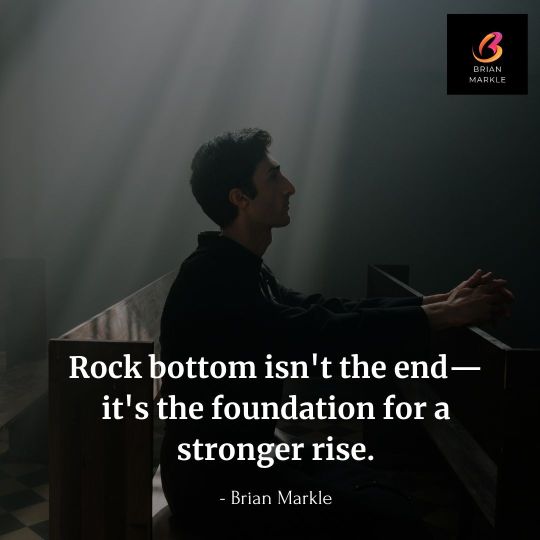
Brian Markle shows that rock bottom is not a defeat but a powerful beginning. His journey from addiction to advocacy proves that true strength is built in the lowest moments, laying the groundwork for lasting change and meaningful community impact.
0 notes
Text
Brian Markle Shares 5 Tips for Launching a Local Meal Program That Makes a Difference

In Ottawa, Brian Markle has long been an advocate for community support, and one of his key initiatives has been launching meal programs that provide essential nourishment to those in need. Given the rising economic challenges, especially in light of the ongoing pandemic, meal programs are more crucial than ever. Here are five tips, shared by Markle, for anyone looking to start a local meal program that truly makes a difference.
1. Identify the Community’s Needs
Before launching any program, it’s essential to understand the specific needs of the community you're serving. Brian Markle emphasizes that successful programs are rooted in understanding the gaps—whether it’s families struggling with food insecurity, seniors facing isolation, or people dealing with homelessness. Conduct surveys, speak with local organizations, and engage with the community to tailor your efforts accordingly.
2. Build Strong Partnerships
Collaboration is key. Markle highlights the power of partnerships with local businesses, churches, and other nonprofits. These organizations often have the resources, networks, or volunteers needed to scale up meal programs effectively. For instance, collaborating with grocery stores for food donations or partnering with shelters can increase the program's reach, ensuring no one is left without support. By fostering these relationships, the program benefits from a broader support base.
3. Plan and Organize Efficiently
Having a clear plan in place ensures that your meal program operates smoothly and meets its objectives. Brian Markle stresses the importance of logistics—ensuring that meals are prepared, packed, and distributed on time. This requires organizing volunteer schedules, establishing a kitchen or distribution center, and clearly communicating roles to ensure there are no bottlenecks. Consistency in delivery is essential, especially when the community relies on your program to meet basic needs.
4. Create Awareness and Build a Supportive Network
Getting the word out about your meal program is crucial to its success. In addition to building awareness through social media, flyers, and local newsletters, Markle recommends reaching out to local influencers, faith-based groups, and media outlets. Share the stories of those benefiting from the program to connect with others who may want to contribute—whether it’s through donations, volunteering, or spreading the word. By creating a supportive network, you’ll build a community that’s invested in sustaining the program long-term.
5. Make the Experience Personal and Engaging
While providing food is the primary goal, Brian Markle encourages programs to also focus on the human side of support. He suggests taking the time to interact with recipients, getting to know them, and offering other forms of assistance, such as connection to housing resources or job opportunities. Personal touches, like greeting people with a smile or offering a warm drink, make a significant difference in uplifting their spirits and letting them know they’re valued. A meal program shouldn’t just fill stomachs; it should nourish the soul.
Conclusion
Brian Markle’s approach to community service highlights how thoughtful planning, strong partnerships, and genuine care can turn a simple meal program into a lifeline for those in need. By following these tips, anyone can start a program that doesn’t just feed people, but fosters a sense of belonging, support, and hope. As Markle’s efforts have shown, when we come together, we can make a lasting impact—one meal at a time.
0 notes
Text
Brian Markle Shares 5 Powerful Ways to Support Recovery in Your Community
Discover five impactful strategies shared by Brian Markle to support addiction recovery in your community during challenging times. Learn how you can make a real difference.
0 notes
Text
Facing the Impact: Brian Markle Responds to U.S. Tariffs, Food Shortages & Addiction Crises in Canada

With rising concerns over new U.S. tariffs affecting Canadian imports, families across the country are bracing for a new wave of food shortages and higher grocery bills. These economic shifts are hitting the most vulnerable populations hardest—those already facing poverty, mental health struggles, and addiction.
Brian Markle, an Addiction and Community Services Worker (ACSW), CASCC advocate, and member of Alcoholics Anonymous (AA), is taking real steps to help people who are already stretched thin. Through his outreach, he’s turning rising pressure into purposeful action.
“When food becomes a privilege and not a right, the community must step in,” Markle shared. “We can’t wait for policy changes—people are hungry now.”
Rising Food Costs: A Direct Threat to Canadian Families
With tariffs targeting agriculture, food distribution, and cross-border trade, the cost of staples like dairy, produce, and meat is expected to spike in the coming months. Already, food banks are feeling the squeeze—and so are working families.
Markle recognizes that these changes don’t just affect what's on the table—they affect mental health, stability, and a person’s sense of dignity. That’s why he's expanding partnerships with ministries and grassroots organizations already in the trenches.
Partnering for Impact: Supporting Food Access & Recovery
Markle is now collaborating with food programs like Fire of God Ministries Ottawa, Pastor Alex, Pastor Sue Landry, Marie Pyper, and Chaplain Cindy Orleck, - helping facilitate food donations from local grocery stores and suppliers. These partnerships are vital for keeping shelves stocked and families fed, especially in underserved neighbourhoods.
Through his ongoing outreach work, Markle is also working with individuals facing alcohol and drug addiction, with a special focus on those suffering silently through the economic downturn.
As someone who is actively working their own recovery through AA, Markle understands the unique pressure addiction places on individuals already overwhelmed by financial uncertainty.
0 notes
Text
Community Advocate Brian Markle Responds to Food Shortages Fueled by U.S. Tariffs

Ottawa, ON — March 2025
As the effects of newly implemented U.S. tariffs ripple across Canadian supply chains, families in Ottawa are already feeling the impact at the grocery store. Rising prices—particularly on produce, dairy, and grains—are straining household budgets and increasing demand on local food programs. In response, Ottawa-based advocate Brian Markle is mobilizing grassroots solutions to meet urgent community needs.
Markle, a long-standing Addiction and Community Services Worker (ACSW) and active member of Alcoholics Anonymous (AA), is leading efforts to address growing food insecurity and provide support to individuals battling addiction and mental health challenges.
“These tariffs may look like political policy on paper, but for the families I work with, they mean empty cupboards and tougher choices,” said Markle. “We’re seeing more people unable to afford the basics. That’s unacceptable.”
Partnering with Local Programs to Meet the Need
In coordination with Fire of God Ottawa and other grassroots ministries, Markle is securing surplus food donations from local grocery stores and food suppliers. His initiative aims to ensure that viable food doesn’t go to waste, but instead supports families most affected by the current economic strain.
“If stores can’t sell it, we’ll make sure it feeds someone,” Markle added.
These efforts are vital as Ottawa’s food banks and outreach centers report sharp increases in demand coupled with reduced availability of donations due to inflation and supply chain disruptions.
Supporting Addiction Recovery Amid Economic Stress
In addition to addressing food insecurity, Markle is extending his support to those struggling with substance use—particularly alcohol, which remains a significant concern post-pandemic. Drawing from his own recovery journey in AA, Markle is providing transportation, mentorship, and emotional support to help individuals attend meetings and stay connected to recovery networks.
“Alcoholism thrives in isolation,” he explained. “Helping someone get to a meeting can be the first step back into a supportive community.”
Markle’s Action Plan for 2025
To address the intersecting challenges of food insecurity, addiction, and mental health, Markle is actively developing and launching the following initiatives:
Expanding food donation partnerships with local grocery stores
Supporting outreach and distribution through organizations like Fire of God Ottawa
Coordinating transportation and outreach for AA meetings
assisting in drop-in support groups for mental health and addiction recovery
helping iwith agencies who are Distributing emergency food and hygiene kits to those in crisis
Hosting anxiety and stress management workshops for affected community members
Call for Community Support
Markle is calling on local businesses, churches, and individuals to collaborate and contribute—whether through food, time, funding, or simply spreading the word.“This is bigger than politics—it’s about people,” Markle said. “We have a chance to stand up and support each other. The time to act is now.”
0 notes
Text
A Journey of Compassion: Brian Markle’s Mission to Serve
In a world that often feels divided, individuals like Brian Markle remind us that kindness, generosity, and service to others can bridge even the deepest gaps. Brian Markle has dedicated his life to uplifting those in need, whether through his tireless efforts in Ottawa’s community or his passion for addressing addiction recovery on a broader scale.
A Journey to Markle, Indiana
Brian recently embarked on a significant journey to Markle, Indiana, where he toured a well-known treatment center for addiction recovery. His visit was part of a broader initiative to explore innovative approaches to addiction rehabilitation. This experience was further enriched by visits to five additional treatment centers, where he gained insight into the latest therapeutic methods, support networks, and holistic recovery programs.
For Brian, addiction recovery is more than just a professional interest—it is a mission. By connecting with experts in the field and seeing firsthand how these centers operate, he hopes to bring new perspectives and strategies back to Canada, enhancing support systems for those struggling with substance use disorder.
Making a Difference at Home
While Brian’s journey took him to the U.S., his impact in Ottawa remains unmatched. Through his work with Fire of God Ministries, Brian has played a key role in organizing the Turkey Drive, an annual initiative that ensures families in need receive a warm and nourishing holiday meal. His commitment to food security extends beyond seasonal giving—he has also been instrumental in helping struggling individuals and families access groceries through the Fire of God Ministries grocery program. His hands-on approach means he’s not just organizing from a distance; he’s in the community, personally assisting those who need it most.
Helping Families Secure Housing
Brian understands that stability begins with a safe place to call home. That’s why he has dedicated much of his time to helping individuals transition out of homelessness, connecting them with the resources necessary to secure housing. Whether working with shelters, landlords, or support organizations, Brian has become a key advocate for those seeking a fresh start.
Fostering Peace in Challenging Times
Beyond his direct community efforts, Brian is also deeply aware of the broader economic and political challenges that impact families. With the growing strain of tariffs introduced under the Trump administration, many families are facing increasing financial hardships. Brian has been vocal about the need for solutions that foster peace, economic stability, and social support systems that protect the most vulnerable. He believes that communities must stand together during difficult times and that initiatives promoting unity, rather than division, are the key to overcoming these economic challenges.
A Call to Action
Throughout his journey, Brian remains guided by faith and perseverance. As it is written in Isaiah 41:10: "So do not fear, for I am with you; do not be dismayed, for I am your God. I will strengthen you and help you; I will uphold you with my righteous right hand." This verse serves as a reminder that even in the toughest times, faith and resilience can light the way forward.
Brian Markle’s work is a testament to the power of service and compassion. Whether advocating for addiction recovery, providing food to families, helping individuals secure housing, or promoting peace amid economic uncertainty, his mission is unwavering. His journey—both locally and internationally—continues to inspire those around him, proving that even in challenging times, kindness and action can make a world of difference.
As Brian continues his work, he invites others to join him in making a tangible impact. Whether by volunteering, donating, or simply spreading the message of hope, there is always a way to be part of the solution.
After all, change begins with those who dare to care.
0 notes
Text
Brian Markle Leads 2025 Sobriety Camp to Inspire Hope and Recovery
Brian Markle and a dedicated team launch the 2025 Sobriety Camp, offering recovery support and community aid. Join the mission of hope and transformation today!
0 notes